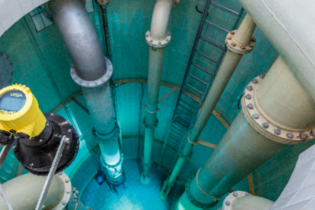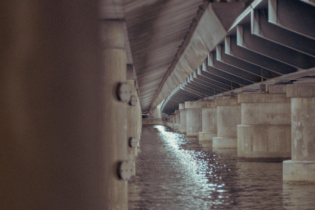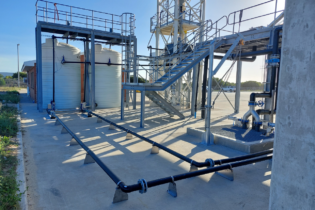Water is at the centre of many social and economic problems throughout South Africa, and the ongoing water issues don’t only affect drinking water, but crucially wastewater too.
Kate Stubbs, group director for business and marketing for Interwaste, a waste management company operating in Southern Africa, says “When we think about the water crisis, we often visualise dry taps, but we don’t think about All the processes that require water- like flushing toilets.” Wastewater is the often-underappreciated element in South Africa’s water woes. “Globally, there is a consensus that water being a finite resource, will lead to a bigger water crisis. From the South African perspective, we are already a water-scarce country as a baseline even before we add infrastructure problems and non-revenue water to the mix” adds Kate.Water, infrastructure, and the need to invest

Wastewater treatment plant. Wastewater is often not fully appreciated for its usefulness and impact on water usage. Finding creative and innovative ways to reuse this neglected resource is a possible solution to the water crisis.
“We know that South Africa has infrastructure problems, but the scope is often not fully appreciated. Waste management infrastructure and systems are inadequate, and this leads to serious pollution of our water sources, industrial pollution and wastewater treatment plants not working also contribute to the ongoing problem,” says Kate.The Green Drop Report, which looks at the wastewater in South Africa, has shown a significant decline over the last 10 years, Kate adds, “Water is a system, so problems feed each other. When wastewater treatment plants are not operating properly, they pollute the water systems, and these polluted water systems then need additional treatment, which our infrastructure is struggling to do, this is then made exponentially worse with non-revenue water and leakages.” Failing the proper maintenance of South Africa’s infrastructure in the face of climate change provides yet another obstacle. “Climate change has become very tangible, the impact of droughts and severe storms on our already ailing infrastructure has shown that our infrastructure doesn’t just need maintenance but also to be climate-proofed, another layer effecting the water in South Africa,” says Kate.
Waste, water, and you
“Waste is something people don’t think about until it affects them. It is very much hidden from our minds and sight, but waste has a profound impact on our water,” says Kate. The fact is that if waste is not managed correctly, it becomes pollution, and this pollution affects our water supplies, and groundwater quality. There is also a dissociation that takes place in the minds of people in homes, businesses, and industry, who through using water create wastewater. Wastewater is not just the sewage produced, but it is also the water used in industrial practices: washing, cleaning, and manufacturing. It is also the water used in agriculture that becomes contaminated with chemicals. “Wastewater is much larger than most people imagine, but there is a unique opportunity with wastewater, in that effective systems can re-use and repurpose wastewater for greater efficiency,” says Kate. Utilising wastewater for industrial purposes can alleviate the stress on South Africa’s freshwater systems or even be treated and put back into South Africa’s potable water system. “The stats vary, but between 5-10% of South Africa’s wastewater is reused efficiently. For a water-scarce country, this is a problem. Other water-scarce countries reuse their water at a far higher rate. Especially those in the Middle East, who reuse their recycled water for irrigation. In South Africa, about 60% of the total water used is for agriculture which provides a significant opportunity to reuse South Africa’s wastewater in this sector to become more water-efficient,” says Kate of the opportunity in the crisis.The changing environment and greater emphasis on sustainability have also forced businesses to relook at their practices, “the emphasis on ESG reporting, and businesses becoming more aware of their impact has shown an uptake in the private sector looking to have their own wastewater treatment on-site to repurposes their water. Corporate responsibility is reshaping the way wastewater is viewed within the industry,” adds Kate.
Waste management
Liquid waste and water are banned from landfill sites, Kate says that this shifts the responsibility onto the producers of wastewater, but cautions that all wastewater should be treated differently because the contaminants vary per case and that wastewater producers ought to not look for a ‘silver bullet’ but do their due diligence in treating their waste. Wastewater is banned from landfills because the waste and water mix to become leachate, a seriously damaging liquid that is exceedingly difficult to treat and poses the risk of contaminating groundwater. While waste and its associated infrastructure are adding to the water issues of South Africa it is also a solution. In 2024 Interwaste launched a state-of-the-art Leachate and Effluent Treatment Plant, Kate says, “Typically wastewater from landfills have no solutions as it is very difficult and specific to treat but this plant is capable of taking wastewater from landfills and treating it, providing 80-90% recovery of clean water.” The plant is capable of treating 43 million Liters of water per year, a significant achievement considering the lack of solutions that preceded the plant. Kate adds that the plant does not produce potable water, but water clean for reuse, this is aimed at relieving the burden on our potable water supply. The drive for better wastewater treatment facilities is also coming from the national and municipal level, Kate adds “government is looking at upgrading their wastewater treatment plants and making treated wastewater more available to the market. Reusing water will be an important feature of the plans to solve the water crisis. In Cape Town, industry can purchase treated water at a lower cost than freshwater and expanding this market will be a big step for the wastewater sector.” Kate also says that it’s not just the public sector but from an industry perspective, larger water users are looking at on-site effluent treatment plants. They’re able to then reuse and repurpose their water for their own purposes, once again, over the longer term, reducing costs, and reducing reliance on these freshwater systems, “from a business perspective it makes economic sense.”Skills and investment

While leakages represent a significant amount of the water loss in South Africa, flushing 9 litres of water every time the toilet is used is seen as normal. This is unsustainable and especially egregious during times of water insecurity.
“Companies are often shocked at the cost of compliance but when the risks of no water, and water loss are thoroughly accounted for the investment still makes sense.”As South Africa, and specifically Gauteng, navigates its water supply issues wastewater will play a crucial role in achieving water security as well as better environmental practices.







